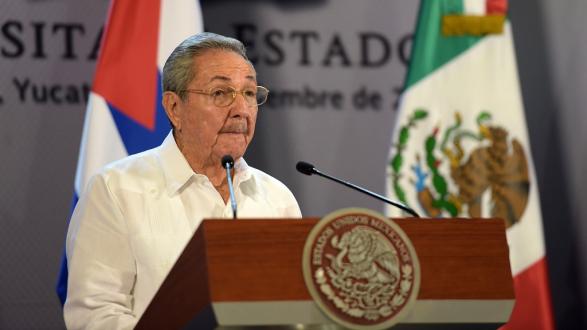In:
Global Beat is your weekly stop for news from around the world. Join us every Friday morning for important stories you should know about.
This week, Cuba announces plans to hold elections later this year; Otto Warmbier is medically evacuated from North Korea to the United States; the European Commission launches a legal case against three EU countries for refusing to take in refugees; and more.
____________________
Americas
Cuba has announced plans to hold municipal elections later this year, a process that is expected to lead to the transfer of power from Raúl Castro to the next president. Castro will, however, remain head of the Communist Party, Cuba’s only political party and the power center of Cuban politics. On Friday, U.S. President Donald Trump is expected to announce a rollback of former President Barack Obama’s opening to Cuba.
Also check out:
- Puerto Ricans vote for statehood – Jennifer Levitz and Arian Campo-Flores, The Wall Street Journal
Central & South Asia
Chinese Foreign Minister Wang Yi is expected to travel to the capitals of Pakistan and Afghanistan later this month to facilitate discussions aimed at improving relations between the two neighbors. Last month 150 people were killed in a deadly bomb blast in Kabul. Although no group claimed responsibility, the Afghan government blamed the Haqqani network and Pakistan’s ISI for the attack.
Also check out:
- Expo 2017 Astana: Kazakhstan’s epitome of structural reform – Rendi Witular, The Jakarta Post
China & East Asia
An American college student imprisoned by North Korea was medically evacuated back to the United States on Tuesday after serving 17 months of a 15 year sentence. Otto Warmbier has been in a coma for over a year and has suffered severe neurological injury, according to his parents. North Korean officials claim Warmbier contracted botulism and slipped into a coma after being given a sleeping pill, an explanation his parents reject. The United States has been working with the Swedish embassy in North Korea to free three remaining Americans detained in the country.
Also check out:
- Taiwan reacts defiantly as Panama switches diplomatic ties to China – Simon Denyer, Washington Post
Europe & Russia
The European Commission launched a legal case against three EU countries for refusing to take in refugees. Poland, Hungry, and the Czech Republic have refused to accept anyone under a plan agreed to by a majority of EU leaders in 2015. The agreement was intended to ease the burden on frontline states Italy and Greece, by relocating migrants to other EU countries. The move is likely to reinvigorate the debate over independence of EU states from Brussels.
Also check out:
- The Dutch have solutions to rising seas. The world is watching – Michael Kimmelman, The New York Times
Middle East & North Africa
In a move that has attracted widespread public criticism, Egypt’s parliament has agreed to turn over the islands of Tiran and Sanafir to Saudi Arabia. The Egyptian and Saudi governments claim that the islands are Saudi but, at the request of Saudi Arabia, have been subject to Egyptian protection since 1950. Those opposed to the move accuse Egyptian President Abdel Fattah el-Sisi of handing over the islands in return for continued Saudi aid.
Also check out:
Southeast Asia & Oceania
The government of Australia has agreed to pay $53 million ($70 million AUD) to refugees detained in Papua New Guinea for the alleged harm they suffered while being held on Manus Island. Although the Australian government agreed to the settlement, they strongly deny the accusations. It is Australian policy to turn away any refugees or asylum seekers arriving by boat and send them instead to Papua New Guinea and Nauru. The government maintains that the policy, which is heavily criticized both domestically and internationally, deters migrants from attempting the life-threatening voyage to its shores in trafficking boats.
Also check out:
- Indonesia’s military chief says ISIL cells are in ‘almost every province’ of the country – Kevin Lui, TIME
Sub-Saharan Africa
The World Bank and African Development Bank (ADB) have stepped in to fill a gap in funding left by traditional donors intended to address the record-breaking 26.5 million people currently going hungry in the Horn of Africa. In an unprecedented move, the World Bank has given $50 million to the International Committee of the Red Cross and the UN Food and Agriculture Organization to distribute emergency aid in Somalia, a country on the verge of famine. The ADB has also announced $1.1 billion to combat drought in six countries, where lack of rain has led to the biggest food insecurity and displacement crises the region has ever faced.
Also check out:
- In Kenya, micro grids are boosting access to electricity for rural communities – Anmar Frangoul, CNBC




